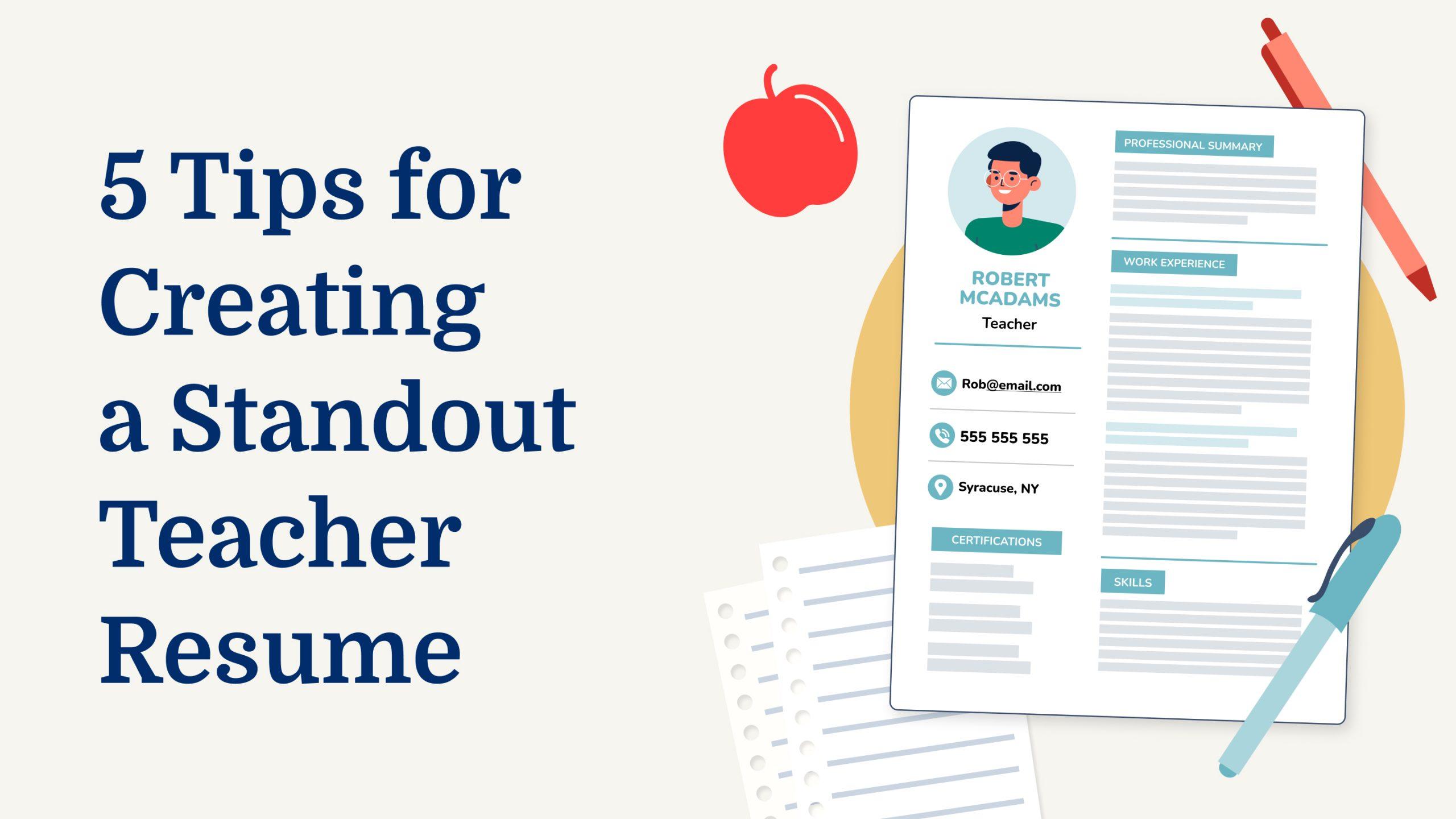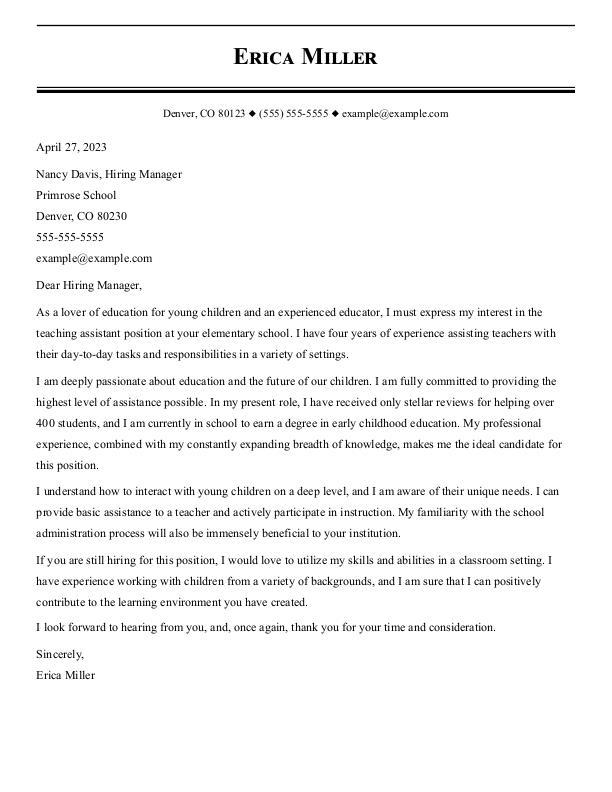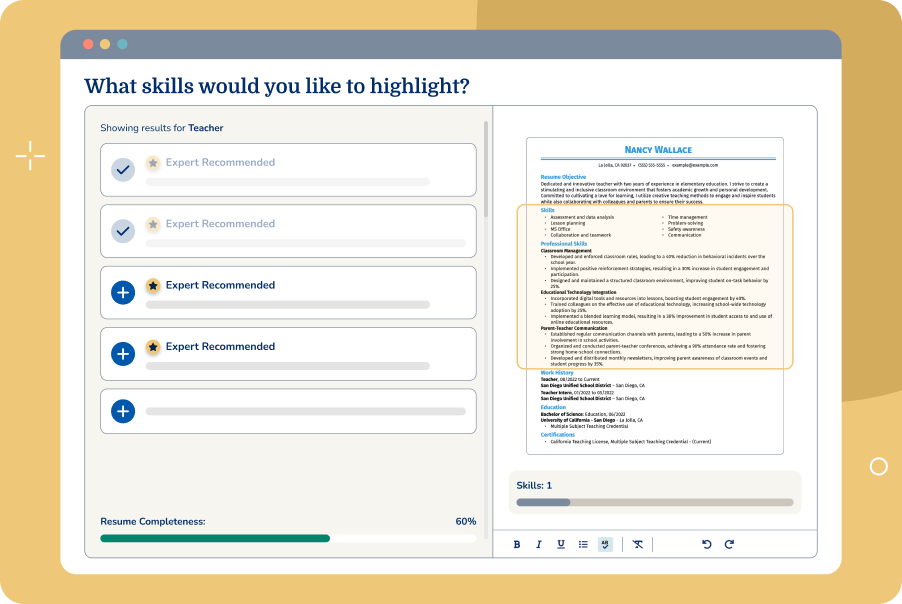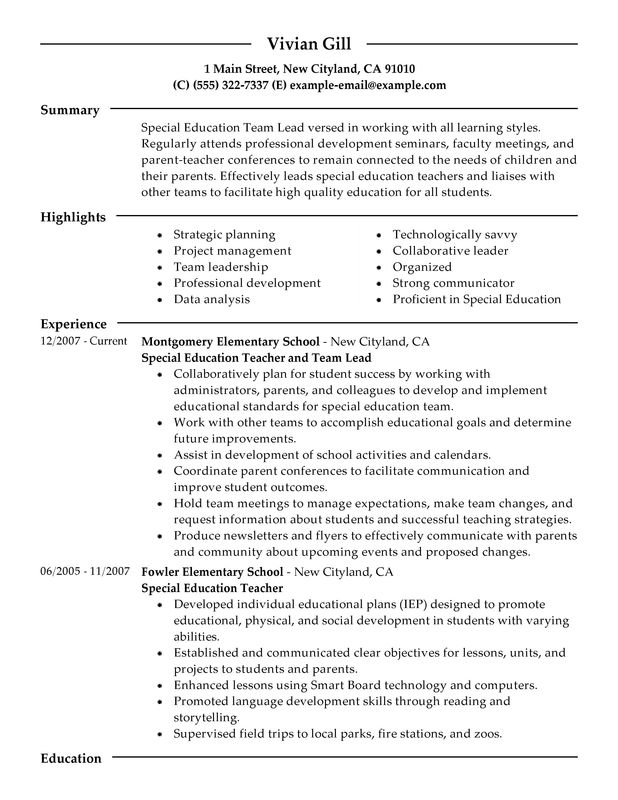Why this resume works
- Quantifies accomplishments: Includes measurable accomplishments, such as a 20% increase in student performance, directly highlighting the job seeker’s impact on educational outcomes.
- Showcases career progression: Details the job seeker’s progression from assistant teacher to teacher, clearly demonstrating a steady increase in responsibility and leadership over time.
- Illustrates problem-solving ability: Highlights how the job seeker used interactive lesson plans to boost student performance, demonstrating problem-solving skills and a creative approach to overcoming classroom challenges.
More Teacher Resume Examples
Our teacher resume samples provide valuable tips for showcasing your instructional expertise, curriculum development skills, and educational achievements. Use these teaching resume examples to create a standout resume tailored to various teaching roles.
Entry-Level Teacher
Why this resume works
- Features education section: The education section is neatly formatted and clearly lists degrees that highlight the job seeker’s strong and relevant academic background.
- Touches on accomplishments: Underscores impact and contributions by listing impressive accomplishments, such as mentoring new teachers and facilitating professional development workshops.
- Puts skills at the forefront: Key skills are prominently listed in a dedicated section, making it easy for employers to quickly assess the job seeker’s relevant capabilities for an entry-level position.
Mid-Level Teacher
Why this resume works
- Includes mix of soft and hard skills: Effectively presents a blend of soft and hard skills, detailing achievements in student engagement and digital learning implementation alongside strong interpersonal initiatives like leading school programs.
- Demonstrates language abilities: Showcases language skills through detailed proficiency levels in English, Spanish, and French, emphasizing the job seeker’s capacity for cross-cultural communication.
- Displays technical expertise: Highlights technical expertise by showcasing educational technology in teaching roles and listing specific certifications such as TESOL and professional educator licenses.
Experienced Teacher
Why this resume works
- Showcases impressive accomplishments: Highlights impressive accomplishments by detailing notable improvements in student performance and successful curriculum revamps, reflecting senior-level impact and dedication.
- Focuses on work history: The chronological format emphasizes a steady work history, outlining the progression from junior educator to teacher and highlighting growth and extensive experience over 12 years.
- Emphasizes leadership skills: Emphasizes leadership skills through achievements like supervising teams of teachers, organizing school events, and mentoring new educators to significantly reduce turnover.
Teacher Resume Template (Text Version)
Chris Jones
Riverside, CA 92508
(555)555-5555
Chris.Jones@example.com
Professional Summary
Dedicated teacher with 6 years of experience enhancing student performance. Proficient in curriculum development and student assessment, with a track record of improving exam scores by 15-20%. Skilled in lesson planning and classroom management.
Work History
Teacher
Springfield High School – Riverside, CA
January 2022 – March 2025
- Implemented interactive lesson plans
- Increased student performance by 20%
- Led school science club activities
Instructor
Bright Future Academy – San Diego, CA
January 2019 – December 2021
- Designed curriculum for grades 5-8
- Boosted exam scores by 15%
- Organized parent-teacher conferences
Assistant Teacher
Greenfield Elementary – Riverside, CA
January 2017 – December 2018
- Provided support for lead teachers
- Coordinated classroom activities
- Reduced student absenteeism by 10%
Skills
- Lesson Planning
- Classroom Management
- Student Assessment
- Curriculum Development
- Educational Technology
- Differentiated Instruction
- Behavior Management
- Parental Communication
Education
Master of Education Secondary Education
University of Illinois Urbana-Champaign, Illinois
May 2016
Bachelor of Science Education
Illinois State University Normal, Illinois
May 2014
Certifications
- Certified Educator Level 1 – Google for Education
- ESL Teaching Certificate – TESOL International Association
Languages
- English – Beginner (A1)
- Spanish – Beginner (A1)
- French – Intermediate (B1)
Popular Skills for a Teacher Resume
A comprehensive resume skills section is essential for effectively demonstrating the technical and interpersonal qualities required for a teaching position.
By showcasing a blend of hard skills like lesson planning and soft skills such as patience and communication, you can distinguish yourself in this profession.
Below are a few of the top soft skills frequently listed on teacher resumes.
| Soft Skills | % of resumes with this skill |
|---|---|
| Critical thinking | 57.92% |
| Classroom management | 56.29% |
| Motivating students | 53.41% |
| Parent-teacher communication | 24.45% |
| Behavior management | 22.72% |
Here are a few examples of hard skills frequently included on teacher resumes.
| Hard Skills | % of resumes with this skill |
|---|---|
| Lesson planning | 54.22% |
| Classroom instruction | 18.25% |
| Curriculum implementation | 16.87% |
| Child development | 16.43% |
| Learning strategies | 16.39% |
Related Resume Guides
Advice for Writing Your Teacher Resume
Explore expert advice on how to write a resume specifically tailored for teachers. We’ll walk through how to highlight your educational background, classroom experience, and passion for inspiring students.

Highlight relevant certifications and training
Certifications and specialized training are essential for teachers as they demonstrate expertise and dedication to the profession. These credentials ensure that educators are well-prepared to address diverse student needs and stay current with educational advancements.
By highlighting certifications, teachers can showcase their qualifications and commitment to professional growth. For better visibility, create a Certifications section right after your education or skills.
List relevant certifications on your resume, such as a State Teaching License (K-12), National Board Certification (NBPTS), TESOL/TEFL Certification, or Google Certified Educator.
Include any field-specific training like Special Education Certification, Reading Specialist Certification, or STEM Teaching Certification. Clearly state the certification name, issuing organization, and date obtained to provide a comprehensive view of your qualifications.
This approach not only highlights your readiness to teach but also underscores the specialized skills that set you apart from other candidates.
Example of a certifications section
National Board Certification
Issued by: National Board for Professional Teaching Standards (NBPTS)
Issued 2021
Google Certified Educator Level 2
Issued by: Google for Education
Completed 2023
TESOL Certification
Issued by: Teachers of English to Speakers of Other Languages (TESOL) International Association
Issued 2020
First Aid and CPR Certification
Issued by: American Red Cross
Expires 2024
Classroom Management Training Program
Issued by: Association for Supervision and Curriculum Development (ASCD)
Completed 2022
Reviewing professional resume examples can provide valuable inspiration and help you present your skills and qualifications in the best possible light.
List your most relevant skills
When creating a resume for a teaching role, it’s important to highlight technical skills and soft skills. Technical skills can include proficiency with educational software like Google Classroom, Zoom, or SMART board technology.
Soft skills such as communication, patience, creativity, and classroom management are equally important. These skills help you connect with students and create an effective learning environment.
Include a dedicated Skills section on your resume to showcase these abilities. List software proficiencies and artistic talents clearly so they stand out. For example, you might write “Proficient in Microsoft Office Suite” or “Skilled in developing engaging lesson plans.”
Additionally, weave these skills into your work experience bullet points for more significant impact. Instead of just stating responsibilities, highlight achievements demonstrating your skills in action. For instance, “Used interactive whiteboard technology to enhance student engagement” shows your technical ability and effectiveness as a teacher.
By organizing your resume this way, you make it easy for hiring managers to see how well-rounded you are as a teacher and how your skills directly contribute to classroom success.
Using the right resume keywords from the job description can help you pass applicant tracking systems (ATS) and catch the eye of recruiters.
Write a strong professional summary
A professional summary is a brief statement at the top of your resume that showcases your teaching skills, experience, and accomplishments. It’s essential to make a strong first impression as it’s the first thing hiring managers see.
For experienced teachers, this summary highlights years of classroom success and advanced skills in lesson planning and student engagement.
If you are a new teacher with limited work experience, consider using a resume objective instead. This focuses on your career goals and what you aim to offer to the school community. Use action-oriented language like “motivated,” “dedicated,” or “passionate” to show enthusiasm and potential.
To complete this section effectively, list key skills such as curriculum development, classroom management, or differentiated instruction. Highlight any achievements like improved test scores or successful projects that demonstrate your impact as a teacher.
Tailor each point to reflect how they align with the job you’re applying for. This makes your resume more compelling and relevant to potential employers.
Teacher resume summary examples
Entry-level
Recent education graduate with a bachelor’s degree in elementary education and a state teaching certification. Completed student teaching internship with hands-on experience in classroom management, lesson planning, and student engagement strategies. Proficient in integrating technology into the curriculum and passionate about fostering a positive learning environment for all students.
Mid-career
Dedicated teacher with over 7 years of experience in middle school education, specializing in English language arts. Proven track record of improving student literacy rates through innovative teaching methods and personalized instruction. Skilled in curriculum development, classroom management, and using data-driven approaches to enhance student performance. Recognized for creating inclusive classrooms that accommodate diverse learning styles.
Experienced
Seasoned educator with over 15 years of experience teaching high school mathematics and leading academic departments. Expertise in curriculum design, professional development, and implementing advanced pedagogical techniques to drive student success. Known for mentoring new teachers, achieving significant improvements in standardized test scores, and fostering collaborative relationships among faculty to promote a cohesive educational environment.
Teacher resume objective examples
Recent graduate
Enthusiastic and dedicated recent graduate with a bachelor’s degree in education, seeking an entry-level teaching position to apply my passion for fostering student learning and educational development. Committed to creating a positive and engaging classroom environment that encourages growth and success for all students.
Career changer
Motivated professional transitioning from a corporate training role into the field of education. Bringing strong skills in communication, curriculum development, and team collaboration, aiming to leverage these abilities in an elementary school setting to inspire and educate young minds.
Specialized training
Recent graduate with a specialization in STEM education, eager to join a forward-thinking middle school as a science teacher. Passionate about applying hands-on learning techniques and innovative instructional strategies to help students develop critical thinking skills and a love for science.
Try our Resume Builder to quickly create a polished resume. We offer professional templates that make your experience shine.
Showcase your accomplishments and publications
Including conference presentations, research accomplishments, and publications on your resume can significantly boost your resume as a teacher. This information highlights your expertise, commitment to continuous learning, and contributions to your field.
It shows you are active in the academic community and stay current with new developments. Adding these details provides proof of your ability to conduct research and communicate findings clearly.
Create a Publications section by listing peer-reviewed articles, book chapters, and conference papers in an organized format. Use a professional style guide like APA, MLA, or Chicago for citation details (journal name, volume, issue, year).
Emphasize major awards, grants, and fellowships to enhance your research credibility. If relevant, include links to online research profiles such as Google Scholar, ResearchGate, or ORCID.
This strategy allows potential employers to see the extent of your scholarly work and reinforces your dedication to education and professional development as a teacher.
Example of a publications section
Peer-Reviewed Journal Articles
- Johnson, L., & Martinez, S. (2020). Innovations in teaching methodologies for primary education. Journal of Educational Research, 52(4), 245-260.
- Martinez, S., & Johnson, L. (2019). Collaborative learning in secondary schools: A case study. International Journal of Education, 48(1), 10-28.
Conference Papers
- Johnson, L., & Patel, R. (2018). The role of technology in modern classrooms. In Proceedings of the International Conference on Education and Information Technology (pp. 89-97). New York: ICEIT.
- Patel, R., & Johnson, L. (2017). Enhancing student engagement through interactive learning modules. In Proceedings of the Annual Meeting of the American Educational Research Association (pp. 112-118). San Francisco: AERA.
Choose a straightforward and minimalist resume template featuring clear headings and legible fonts. Avoid excessive colors or elaborate designs that might hinder readability.
Salary Insights for Teachers
Compensation often depends on factors like location and job title. Exploring industry salary trends can help you evaluate your earning potential and make smart career choices. See the breakdown below for more insight.
Top 10 highest-paying states for teachers
Our salary information comes from the U.S. Bureau of Labor Statistics’ Occupational Employment and Wage Statistics survey. This official government data provides the most comprehensive and reliable salary information for teachers across all 50 states and the District of Columbia. The figures represent the most recent data available as of May 2023.
The national average salary for teacher is $82,093.
| State | Average Salary |
|---|---|
| Rhode Island | $119,840 |
| New York | $94,030 |
| Massachusetts | $93,240 |
| District of Columbia | $93,040 |
| Virginia | $89,700 |
| Maryland | $87,300 |
| Kansas | $85,120 |
| California | $85,230 |
| Oregon | $83,380 |
| New Hampshire | $80,220 |
FAQ
Do I need to include a cover letter with my teacher resume?
While it may not always be required, a well-crafted cover showcases your passion for teaching and highlights experiences that align with the school’s needs.
For example, if the school emphasizes project-based learning or focuses on technology integration, you can mention relevant experience in those areas.
You can use our Cover Letter Generator to easily create a cover letter using your resume or make a new one from scratch with step-by-step prompts.
We also recommend exploring our cover letter examples for expertly crafted samples tailored to a variety of experience levels and unique situations.
How long should a teacher’s resume be?
A teacher with fewer than 10 years of experience should aim for a resume length of around one-page to keep it concise and focused. Highlight your teaching certifications, relevant skills, and key accomplishments in the classroom.
If you have more than 10 years of experience or notable achievements such as published work or leadership roles, using a two-page resume is acceptable.
Emphasize recent positions and significant contributions to demonstrate your impact as an educator. Prioritize clarity and relevance to make a strong impression.
How do you write a teacher resume with no experience?
When writing a resume with no experience, prioritize your education, skills, and any relevant experiences that highlight your potential as an educator.
Begin by listing your degree in education or related fields first. Include the institution’s name, graduation date, and any honors received. Prominently feature any teaching certification programs or licensure you have completed.
Detail your student teaching experiences and internships by noting the grade levels taught, subjects covered, and specific methods used. Highlight positive feedback from supervising teachers or mentors.
Emphasize vital teaching skills such as communication, organization, classroom management, and lesson planning. Volunteer work, tutoring, mentoring roles, or leadership positions can also be relevant here.
To demonstrate your commitment to ongoing learning and professional growth, include workshops, seminars, online courses, or training sessions attended that pertain to education.
Rate this article
Teacher
Additional Resources

Teacher Cover Letter Examples & Templates
Teachers play a vital role in educating and shaping future generations. They work in a variety of settings, including public and private schools, colleges and universities and community organizations. Teachers

Teacher’s Aide Cover Letter Example & Templates
To write a letter like the free teacher's aide cover letter sample above, you will need to ensure that your letter contains certain things. If you want to appear to

Teacher Assistant Cover Letter Example & Templates
When paired with a well-written resume, a strong cover letter can help you stand out from the crowd. This guide to writing an impressive cover letterfor a teacher assistant position

Teacher Skills: Examples for Your Resume
Teaching is a dynamic and rewarding profession that plays a vital role in shaping the future of individuals and society. As educators, teachers have the unique opportunity to inspire and

Special Education Teacher Resume Examples & Templates
Resumes are crucial tools for job seekers, serving as the first impression for potential employers. A well-crafted resume, especially for special education teachers, can showcase your dedication and expertise in

10 Resume Tips for New Teachers From Experienced Teachers
Creating a perfect, career-launching resume is no easy task. Following general resume writing rules can help, but it is also smart to get advice tailored to your specific job search. When you’re
